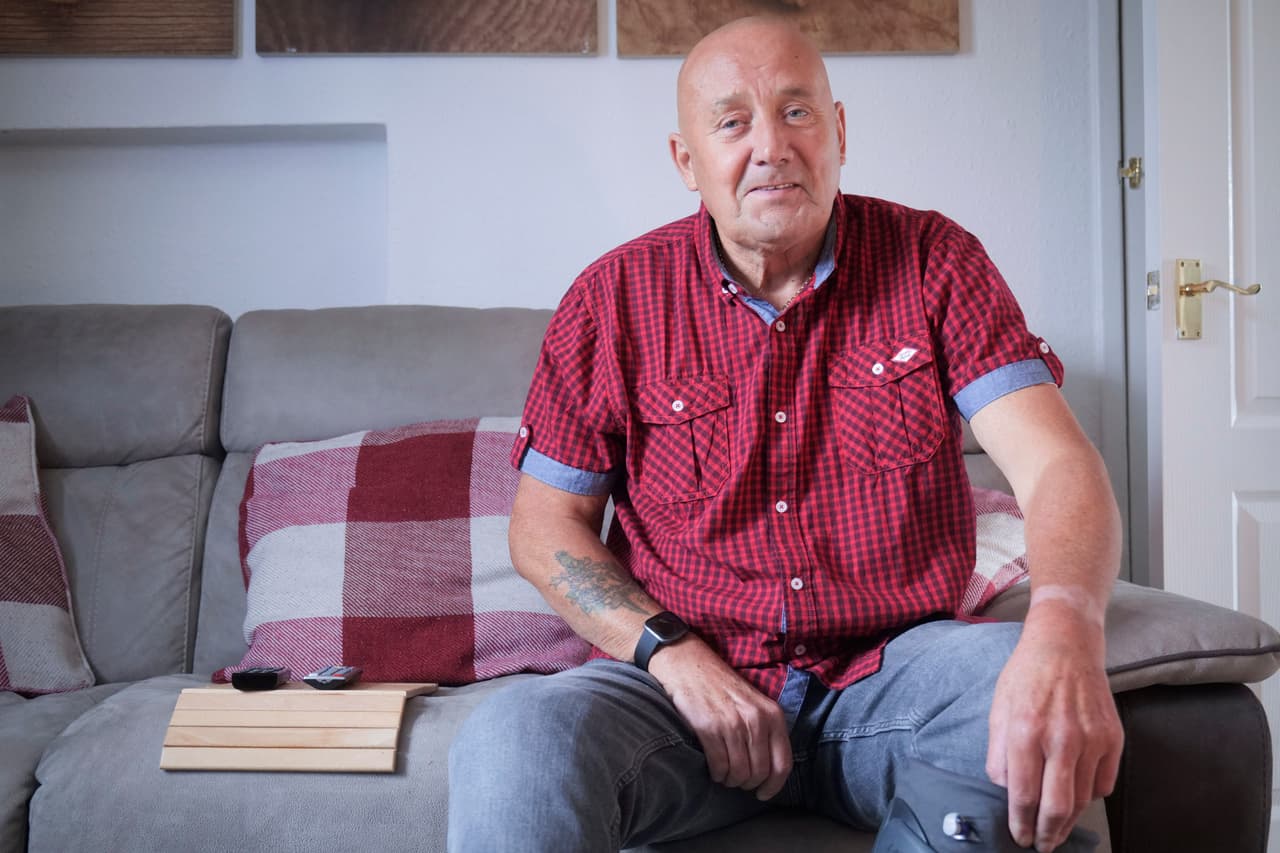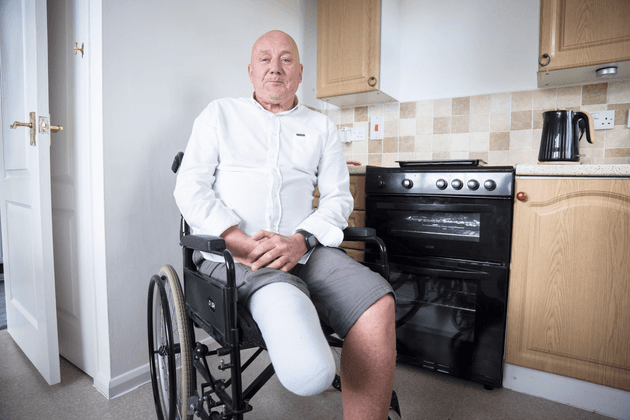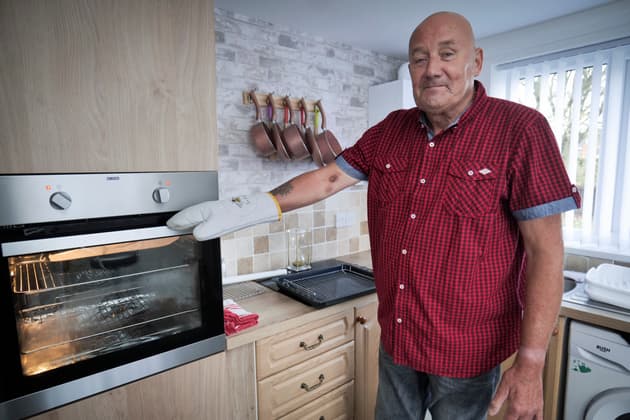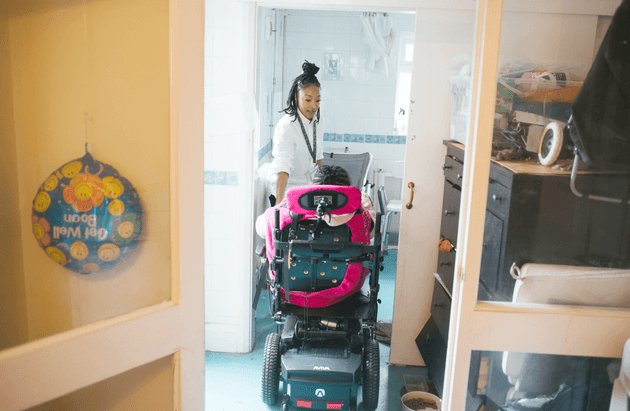
Investigating home adaptations: Did we make a difference?
Almost a year ago, we met Peter Gilroy. Our reporters Rachel Hamada and Vicky Gayle were investigating how disabled people across the UK had been left trapped in inadequate homes waiting for vital adaptations. Peter has a prosthetic leg, and his kitchen was not fit for purpose. His oven was too low, which meant that in order to use it he had to remove his leg, wheel himself into the kitchen, then get out of his wheelchair and down onto one knee. It was laborious and unsafe, but it was either that or live off microwave ready meals.
His daughter Lisa had helped him apply for a Disabled Facilities Grant so his kitchen could be adapted. The statutory part of the process is supposed to take no longer than 18 months: six months to approve the completed application and a year to finish the work. But this doesn't account for the various steps that come before submitting an application, which the Bureau found can take on average more than a year in some areas across England and Wales. When we met Peter, he’d already been waiting four months for a single visit from an occupational therapist.
Many people told us that without sign-off from an OT, there was little hope of even applying for a grant. Across the country we found that six-month approval period – already a long time to be without basic necessities like an accessible kitchen or a safe place to wash – being stretched by long waits for occupational assessments.
Peter and Lisa were stuck in limbo for months while they waited for his assessment.
But as part of our reporting we contacted every council in the UK and the Northern Ireland Housing Executive for data on grants and waiting times. Once we had contacted Peter’s council, he was then visited by an occupational therapist and told he could expect his kitchen adaptation within six months.
That was in April. We went back to see Peter last month – and this is his new kitchen.
 Peter's oven was too low, which meant that in order to use it he had to remove his leg, wheel himself into the kitchen, then get out of his wheelchair and down onto one knee
Mark Pinder
Peter's oven was too low, which meant that in order to use it he had to remove his leg, wheel himself into the kitchen, then get out of his wheelchair and down onto one knee
Mark Pinder
 Now Peter can easily cook his own meals from scratch instead of relying on microwave ready meals
Mark Pinder
Now Peter can easily cook his own meals from scratch instead of relying on microwave ready meals
Mark Pinder
Lisa said our story had a “massive impact” in helping to speed up the process. While waiting for the initial assessment, she had been told by a council worker that her dad could live off microwave meals, despite his diabetes; now he’s back to homemade pies and his own cooking. In the new kitchen, Lisa said, “he’s been able to make his own meals and [has] easy access to the oven without any support”.
His renewed independence has also had a positive impact on Lisa’s life, giving her more time to spend on her children, who have their own disabilities and needs.
Impact is at the heart of what we do at the Bureau. We want to see positive change happen because of our work. Unfortunately, there isn’t always good news from everyone we speak to.
During reporting for the story we also met Rianna and Lauren, sisters from south London. Rianna has cerebral palsy and uses a wheelchair. When we first interviewed the family we heard how Rianna, a keen baker, could not access several rooms in their house, including the tiny kitchen. To wash, Rianna had to travel down from her bedroom in a lift naked before Lauren and their mum could get her onto a shower trolley and wheel her into a wetroom.
When we first met them they needed £100,000 to adapt their home, moving Rianna’s bedroom downstairs and making the kitchen accessible. However, Disabled Facilities Grants are capped at £30,000 in England. Lauren had launched a crowdfunder to supplement the money, and their council advised them to manage the renovation themselves.
 Lauren and Rianna are still fundraising for the adaptations they need to the kitchen and bedroom
Alex Sturrock
Lauren and Rianna are still fundraising for the adaptations they need to the kitchen and bedroom
Alex Sturrock
When we went back to Lauren and Rianna they were still fundraising, but have had to dip into the fund to maintain old equipment and haven’t been able to start the renovations. And as it gets colder, Rianna has to stop taking showers “due to her wet room being poorly insulated”; their £600 energy bills are expected to rise.
We also met Finlay Woodcock-Daniels, who had to use a makeshift toilet in his kitchen for five months. The family did eventually get a grant to put in a stairlift for Finlay, allowing him to move around independently, but they are still lacking permanent ramps for him to get in and out of the garden. As with Rianna and Lauren, there’s a shortfall between the building costs and the maximum grant.
Now Finlay simply can’t borrow any more money, her mum Alexa told us. “I feel like we're stuck waiting and nothing's changing”, she said. Finlay is taking it all in his stride but Alexa said their home, which “should be a place of freedom for him”, is instead “disabling, because he can’t do things at home”.
We don’t just publish our stories and sit back – impact is central to our mission. Our findings were presented to several politicians, including Taiwo Owatemi, MP for Coventry North West, and Wera Hobhouse, MP for Bath, as well as the Welsh government’s head of health and housing and deaf and disabled people’s organisations across the country.
Our reporters and community organisers briefed charities including Age UK and Parkinson’s UK, and submitted evidence to the House of Lords’ adult social care committee. Before the local elections, Inclusion London added an extra point in their housing pledge for candidates explicitly about ensuring Disabled Facilities Grants be completed within 10 months of submitting a completed application, with thanks to our doctoral researcher Ioana Cerasella Chis.
Now the government is preparing to hold consultations on the means test, increasing the £30,000 upper limit, which hasn’t been raised in England since 2008.
When talking about impact, we don’t just mean what happens once our stories are published. It’s also about how we do our journalism.
For Lauren, being part of our story gave her hope that there are “still ethical journalists that advocate for the community”. Finlay’s mum Alexa felt it had been a positive experience, and that her family wouldn’t be in the position they are without the coverage. Both families were able to share their crowdfunders, which gave them a small boost.
Lisa hopes that sharing her family’s story has and continues to raise awareness around the DFG process, and “given other people a little bit of hope to get out there and apply for grants and get what they need”.
If you or someone close to you has a disability, you can find out more about the process of applying for adaptations here.
* This article was amended on 20 December 2022 to clarify that the statutory 18-month timeframe does not account for the pre-application period.
Header image: Peter at home after the adaptations were made. Credit: Mark Pinder
-
Subject:
-
Area:




